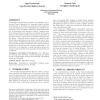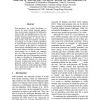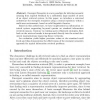2085 search results - page 24 / 417 » Linguistic Knowledge can Improve Information Retrieval |
125
Voted
JCDL
2006
ACM
15 years 7 months ago
2006
ACM
In this paper we introduce POLAR, a probabilistic objectoriented logical framework for annotation-based information retrieval. In POLAR, the knowledge about digital objects, annot...
123
click to vote
COLING
2010
14 years 9 months ago
2010
Near-synonyms are useful knowledge resources for many natural language applications such as query expansion for information retrieval (IR) and paraphrasing for text generation. Ho...
105
click to vote
ACL
1998
15 years 3 months ago
1998
Knowledge acquisition is a serious bottleneck for natural language understanding systems. For this reason, large-scale linguistic resources have been compiled and made available b...
ECIS
2001
15 years 3 months ago
2001
The Internet and Intranet reduce much of the costs of information sharing, but they do not solve receivers' reading and interpretation limitations. Alternatively, browsers an...
108
click to vote
ER
2006
Springer
15 years 5 months ago
2006
Springer
Emergent Semantics is a new paradigm for inferring semantic meaning from implicit feedback by a sufficiently large number of users of an object retrieval system. In this paper, we ...



